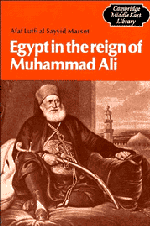Book contents
- Frontmatter
- Contents
- Dedication
- Preface
- Note on transliteration
- 1 Egypt under the mamluks
- 2 Muhammad Ali the man
- 3 A country without a master
- 4 Master in his own house
- 5 Family, friends and relations
- 6 Internal policies
- 7 Agricultural changes
- 8 Industry and commerce
- 9 Expansion to what end?
- 10 The undoing: Muhammad Ali and Palmerston
- 11 The aftermath
- 12 Conclusion
- Notes
- Glossary of Arabic and Turkish terms
- Select bibliography
- Index
2 - Muhammad Ali the man
Published online by Cambridge University Press: 04 April 2011
- Frontmatter
- Contents
- Dedication
- Preface
- Note on transliteration
- 1 Egypt under the mamluks
- 2 Muhammad Ali the man
- 3 A country without a master
- 4 Master in his own house
- 5 Family, friends and relations
- 6 Internal policies
- 7 Agricultural changes
- 8 Industry and commerce
- 9 Expansion to what end?
- 10 The undoing: Muhammad Ali and Palmerston
- 11 The aftermath
- 12 Conclusion
- Notes
- Glossary of Arabic and Turkish terms
- Select bibliography
- Index
Summary
The tiny walled port of Kavala in Macedonia was no different from numberless other equally undistinguished ports of the Ottoman empire. The streets were narrow and winding, the roads and houses whitewashed, shimmering in the heat of noon, hurting the eyes with their glare. Each house was surrounded by a patch of green and a vine or a fig tree to shelter it from the sun. Black-clad women scurried about their business; their men, who were fishermen or sailors, had left the port long before dawn and returned by mid-morning with the day's catch. Here and there a spot of colour revealed a Turkish soldier in uniform, for Kavala, a dot in the middle of a vast Ottoman empire, was administered by an Ottoman governor. The port was a busy one; much of its trade revolved round tobacco which was grown in the hinterland and was of fine quality.
In one of these small white houses a male child, Muhammad Ali, was born. The exact year of the child's birth is uncertain and could have been any time between 1182 A. H. or n 84 A. H., that is, between May 1768 and April 1771. In later years when he had become famous, Muhammad Ali chose 1769 as the year of his birth. The year in which Napoleon, Wellington and Ney were born seemed an auspicious year for brilliant generals.
- Type
- Chapter
- Information
- Egypt in the Reign of Muhammad Ali , pp. 24 - 35Publisher: Cambridge University PressPrint publication year: 1984

